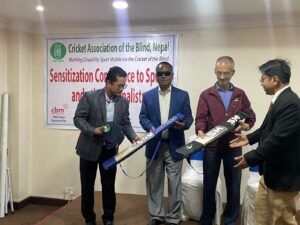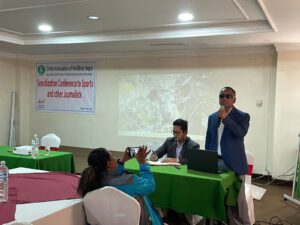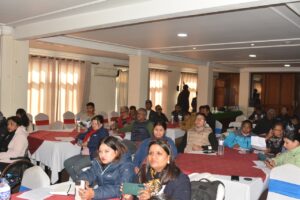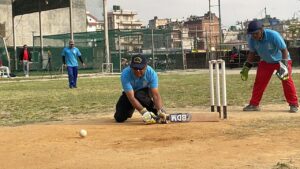National Sports Policy: What it matters to para-sport development in Nepal?
By: Mr. Pawan Ghimire (Chairperson- Cricket Association of the Blind, Nepal)
Sports should transcend ability or disability, gender, and age. At its core, it is about skill development, which can be earned through rigorous practice, and the opportunities created by supportive policies and a positive mindset. A conference organized by the Cricket Association of the Blind, Nepal, in partnership with CBM Global, Nepal on 16th Dec. 2024, aimed to uncover the current status of disability sports in Nepal and discuss the national sports policy in relation to para-sports. The event focused on the gaps and challenges in disability sports, spanning social to legislative issues.
Since the inception of the disability sports movement in 1968, it has made remarkable progress, but continues to struggle for survival despite some notable victories. Ms. Palista Goverdan’s bronze medal and the blind cricket team’s semi-final appearance in the Fourth T20 Blind Cricket World Cup stand as historical milestones. With better policies and a more conducive environment, these achievements could have been even greater.
The government’s initiative to review the national sports policy is a positive step towards making it more relevant and timelier. However, what truly matters is the content of the policy specifically whether it fully encompasses the needs of persons with disabilities. At this stage what can be acclaimed is the Government’s wisdom to incorporate some of the clauses for para-sports activities. The policy has incorporated some of the good points like the draft policy, still pending final approval, lacks a deeper understanding of the distinctions between the Olympics and the Paralympics, the specific needs of disabled athletes, and the accessibility accommodations required to address their impairments. Additionally, the policy’s definitions of terms related to women, children, youth, and veterans are vague, as they fail to include persons with disabilities within these classifications.
A separate clause for Paralympic sports may not be appropriate in this context, as inclusivity and non-discrimination are becoming central to the discourse. The provision should be built on the right-based approach, not a charity-based one, in alignment with the legal frameworks set forth in national and international laws for persons with disabilities.
If time allows, the policy could be further refined to be more inclusive by adhering to the legal provisions outlined in Article 30 of the United Nations Convention on the Rights of Persons with Disabilities and article 34 of Nepal’s Disability Rights Act of 2015. These documents provide clear guidance for the state to adapt existing physical activity curricula, redesign sports infrastructure, utilize accessible technologies, and ensure participation and representation in all tiers of Government owned sports authorities.
It is evident that the policy still requires revisions to enhance its inclusivity for persons with disabilities. The policy should respect the common voices of the floor to have accessible and affordable sports venues, tax exemption in materials meant for the purpose of para-sport activities which are produced within and outside the country, pay equal recognition and merits for the victory, establishment of academy for professional skill development that encompasses talent hunt programs etc. At this stage, it is to be noted down that sports have a greater impact and role in achieving all the 17 goals set forth in the agenda 2030. Whether it is for the poverty reduction through employment opportunity creation, prizes and awards, elimination of malnutrition through the provision of balance diet ultimately leading to the good health and wellbeing. Sports role in fostering social peace and harmony, inclusivity, and reduction of inequality within the country, here needs to be respected. This is very pivotal in case of athletes with disabilities who undergo through the hardship of social and economic deprivation. Thus, the proposed policy should be directed towards addressing the social injustice adhering to the principle of living no one behind or reaching the furthest behind first.
The program marks other remarkable milestones by displaying a video documentary of those soldiers who lost their vision during the past ten years of armed conflict in Nepal and how the game of cricket had helped them to revive back to normal life. Their incredible stories are sure to motivate those losing their vision afterwards and seeking means of revival.
The link for the short video: https://www.youtube.com/watch?v=Pje7l2UsI-4&t=27s










